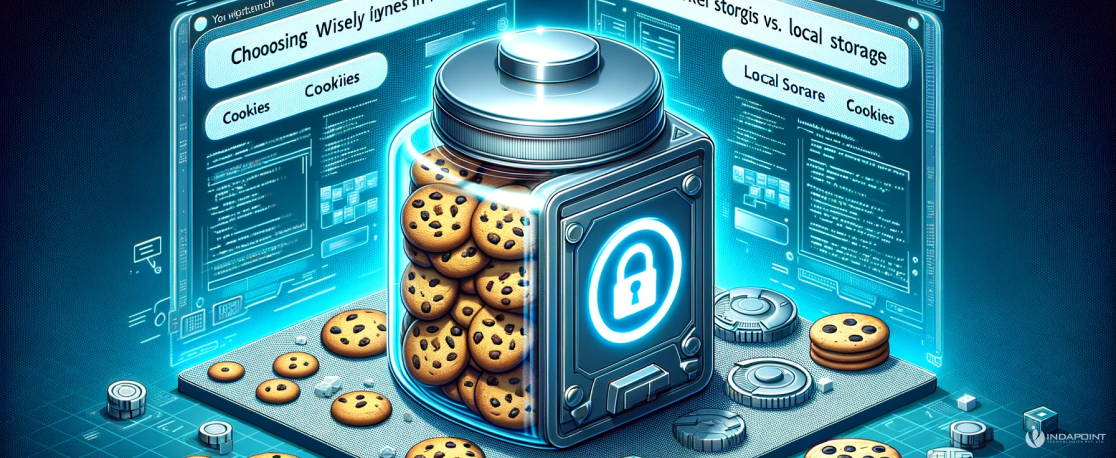Choosing Wisely: The Nuances of Token Storage in Front-End – Cookies vs. Local Storage
December 27, 2023

This blog post explores the pros and cons of using cookies and local storage for front-end token storage. Cookies are widely used for storing information and providing a consistent user experience, but they also have security vulnerabilities. Local storage, on the other hand, allows programmers to store large volumes of data on the client side, providing privacy and better performance. However, it also has limitations, such as the absence of automated encryption and a larger size restriction. Security is a key concern, and developers must ensure strict adherence to security protocols. Performance is another factor, and scalability is another advantage. Business decision-making should consider factors like data size, performance objectives, and security demands. Case studies provide insights into the effects of local storage and cookies on user experience and performance.
Choosing Wisely: The Nuances of Token Storage in Front-End – Cookies vs. Local Storage
Amidst the ever-evolving realm of front-end development, the decisions one formulates concerning token storage possess the potential to profoundly influence the performance, security and overall user experience of an application.
This blog post will provide an in-depth analysis of two notable alternatives: Local Storage and Cookies.
It is imperative for both large enterprises and startups to possess a comprehensive comprehension of these technologies’ complexities in order to make well-informed decisions that are in line with their unique needs.
Understanding the Token Storage Options
Cookies
In web development, cookies have long been the standard for storing information. These data fragments are transmitted from a server to the user’s browser, where they are stored. They support both session and persistent storage, demonstrating their versatility. However, biscuits are not without their advantages and disadvantages.
Pros
The extensive support for cookies across various browsers renders them a dependable option for the storage of tokens. Furthermore, they play a critical role in the administration of user sessions, ensuring a cohesive user experience throughout numerous visits.
Cons
Notwithstanding their widespread usage, cookies do possess security vulnerabilities. These systems are vulnerable to Cross-Site Scripting (CSS) and Cross-Site Request Forgery (CSRF) attacks. Furthermore, the application of cookies to larger datasets may be impeded by their data size restriction.
Storage Local

Local storage, as an alternative to cookies, enables programmers to store more substantial volumes of data on the client side. In contrast to cookies, which are transmitted with each HTTP request, local storage provides a level of privacy by not being routinely transmitted to the server.
Advantages
Local storage demonstrates its superior performance in situations that require the client to store a significant volume of data. Applications that require efficient data access without constant server communication may find this to be a viable alternative.
Constraints
Although local storage mitigates certain deficiencies associated with cookies, it is not devoid of its own set of difficulties. The absence of automated encryption gives rise to security concerns, while the size restriction is greater in magnitude than that of cookies, albeit still limited.
Security Factors to Consider
Cookies in nature Securing cookie identifiers is an extremely important security concern. Essential practices include validating user input, employing secure connections (HTTPS), and implementing secure and HttpOnly markers. Consistently upgrading security protocols and providing developers with education regarding potential threats are essential measures in upholding a strong security posture.
Storage Locale Security

Despite providing benefits in terms of privacy, local storage necessitates strict adherence to security protocols. Input validation and encryption must be implemented by developers in order to thwart common vulnerabilities. Consistent updates and audits are required to proactively address emergent threats.
Cross-browser and Compatibility Considerations
A wide range of browsers are compatible with cookies. In the context of privacy regulations, however, developers should be cognizant of potential complications associated with third-party cookie policies. Consistently conducting tests on multiple browsers is crucial in order to guarantee a smooth user experience.
Consideration Factors for Business Decision-Making Criteria
Particular business requirements must be thoroughly assessed when deciding between local storage and cookies. The process of decision-making should be guided by variables including data size, performance objectives, and security demands. Having a comprehensive comprehension of these technologies enables organizations to make well-informed decisions that are in line with their goals.
Conclusion
When it comes to token storage for front-end development, there are several factors that influence the nuanced decision between local storage and cookies. It is crucial that organizations evaluate the advantages and disadvantages of this decision-making process, taking into account security, performance and scalability.
Do you encounter difficulties in selecting the most suitable token storage solution for your front-end development requirements? Please get in touch with us immediately to discuss your needs, and we will guarantee you our utmost proficiency and experience in integrating the most appropriate technology for your organization.





